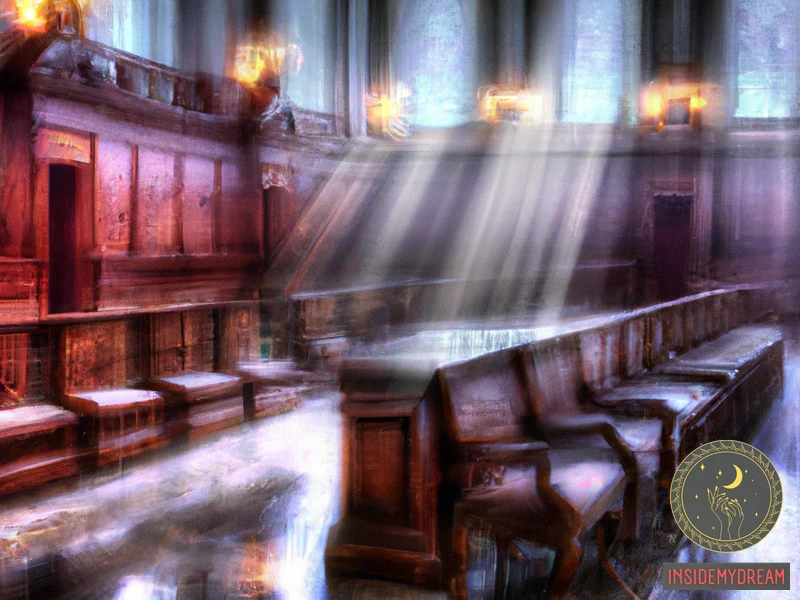The world of dreams is a fascinating and mysterious realm, where symbols and images come to life in the theater of our subconscious minds. One common dream scenario that many individuals experience is finding themselves in a courtroom. As we awaken from these court dreams, we are left with a sense of perplexity, wondering what these vivid scenes may signify. The symbolism behind court dreams holds deep significance, reflecting our fears, desires, and internal conflicts. By decoding the meanings behind these courtroom dreams, we can gain valuable insights into our own emotions, beliefs, and experiences. So, let us venture into the symbolic world of court dreams and uncover the hidden messages that lie within.
The Symbolism of Courts in Dreams

The symbolism of courts in dreams is rich and complex, reflecting various aspects of our consciousness and inner thoughts. When we dream of being in a courtroom or witnessing a courtroom drama, it often represents feelings of judgment, confrontation, seeking justice, anxiety, or even a desire for resolution.
In dreams, a courtroom can serve as a symbol of judgment or confrontation. It may indicate that we are experiencing feelings of guilt, shame, or a fear of being judged by others or ourselves. The courtroom setting amplifies these emotions and reflects our inner conflicts and struggles with our own actions or decisions. A dream about a courtroom may suggest that we are grappling with our own moral compass and trying to find a balance between right and wrong.
Another interpretation of courtroom dreams is the desire for justice or fairness. This may stem from real-life situations where we feel that we have been treated unfairly or have witnessed injustice. The courtroom becomes a symbol for our search for fairness and equality, highlighting our need for resolution or closure in these situations.
Courtroom dreams can also reflect feelings of anxiety and fear of being on trial. This may indicate a lack of confidence or a fear of being judged by others. It could be a manifestation of our insecurities or a reflection of a current situation in which we feel scrutinized or evaluated. This type of dream may symbolize our need to address these fears and insecurities and find ways to overcome them.
Now let’s explore some common court dream scenarios and their interpretations.
1. Courtroom as a Symbol of Judgment or Confrontation
In dreams, the courtroom often symbolizes judgment or confrontation. When we dream of being in a courtroom or witnessing a legal proceeding, it can indicate feelings of being judged or evaluated in some aspect of our lives.
The courtroom setting represents a space where objective decisions are made and conflicts are resolved through a formal process. It is a symbol of the justice system and can be associated with the need for fairness, accountability, and resolution.
Dreaming of a courtroom may suggest that you are currently facing a situation in your waking life where you feel judged or criticized. This could be related to your personal relationships, work environment, or even your own self-judgment. The dream may be highlighting your fear of being confronted or exposed for something you have done or said.
It is important to note that the courtroom symbolism in dreams does not necessarily reflect a literal legal situation. Instead, it is a metaphor for the judgment and confrontation we experience in various aspects of our lives.
The courtroom can also represent a desire for justice or fairness. If you have been wronged or treated unfairly in a particular situation, the dream may be a reflection of your longing for resolution and a just outcome.
The courtroom can symbolize the anxiety and fear of being placed on trial. This could indicate a sense of guilt or worry about being held accountable for your actions or decisions. It may serve as a reminder to examine your behaviors and take responsibility for any negative consequences they may have.
The courtroom in dreams is a powerful symbol of judgment, confrontation, and seeking justice or fairness. It represents our anxieties, fears, and desires for resolution in various aspects of our lives. Understanding the symbolism behind courtroom dreams can provide valuable insights into our emotions and attitudes towards judgment and conflict in waking life
2. Seeking Justice or Fairness
Dreams about courts can often symbolize the dreamer’s desire for justice or fairness in their waking life. The courtroom setting represents a space where judgments are made and conflicts are resolved. In the context of dreams, seeking justice or fairness can manifest in various ways.
One possible interpretation of seeking justice or fairness in a court dream is that the dreamer is yearning for resolution in a situation where they feel wronged or treated unfairly. This could be related to a personal conflict, a disagreement at work, or even a larger issue in society. The dreamer may be feeling a sense of frustration or powerlessness in their waking life and their subconscious is expressing this desire for justice through the symbolism of a courtroom.
Another interpretation is that the dreamer is seeking validation for their actions or choices. They may feel the need to justify themselves or prove their innocence in a certain situation. This could stem from a fear of being judged or criticized by others. The dreamer may be seeking reassurance that their actions are just and fair, and the courtroom represents a place where they can present their case.
Alternatively, seeking justice or fairness in a court dream could reflect the dreamer’s inner conflict between their moral values and their actions. They may be questioning their own integrity or feeling guilty about something they have done. The courtroom symbolizes a place where one’s actions are examined and judged, and the dreamer may be grappling with feelings of guilt or a need for moral guidance.
In analyzing this symbolism, it is essential to consider the specific details and emotions present in the dream. For example, if the dreamer feels confident and empowered while seeking justice in the dream, it may indicate a sense of self-assurance and determination in their waking life. On the other hand, if the dreamer feels anxious or overwhelmed in the courtroom, it could suggest unresolved feelings of insecurity or fear of judgment.
To gain further insight into the meaning of seeking justice or fairness in a court dream, it can be helpful to explore any personal associations or experiences related to courts or legal matters. Additionally, considering the dreamer’s current life situations and emotional state can provide valuable context for understanding the dream’s symbolism.
A court dream involving a desire for justice or fairness signifies the dreamer’s inner longing for resolution, validation, or moral clarity in their waking life. By examining the specific details of the dream and connecting them to the dreamer’s personal experiences and emotions, a deeper understanding of the dream’s meaning can be achieved.
3. Anxiety and Fear of Being on Trial
In dreams, experiencing anxiety and fear of being on trial in a courtroom is a common symbol that can be packed with deeper meanings. This particular dream scenario often reflects the dreamer’s apprehension regarding judgment, criticism, or scrutiny in their waking life.
The courtroom setting in dreams represents a space where judgments are made, decisions are reached, and conflicts are resolved. It serves as a stage for legal battles, where evidence is presented, witnesses testify, and the truth is sought. When one experiences anxiety and fear of being on trial in a dream, it signifies an underlying concern about facing judgment, being criticized, or feeling exposed and vulnerable.
This dream may be a reflection of the dreamer’s fear of being judged or evaluated in their personal or professional life. It could stem from a fear of failure or the need for validation and acceptance. Perhaps the dreamer is going through a period of self-doubt and is constantly questioning their abilities and fearing negative judgment from others.
In some cases, this dream could also point to unresolved guilt or feelings of remorse. The dreamer may be harboring deep-seated guilt about past actions or decisions and is fearful of facing the consequences or being held accountable for their actions.
The anxiety and fear of being on trial in a dream can also be related to the feeling of being trapped or powerless. The dreamer may feel like they are at the mercy of others’ judgments and are unable to defend themselves or express their true thoughts and emotions. This dream scenario may indicate a lack of control or a fear of being falsely accused or misrepresented.
It is important to note that this interpretation may vary depending on the individual’s unique circumstances and experiences. The dreamer’s own associations with courtrooms, trials, and judgment will also play a significant role in determining the exact meaning of their dream.
If the dreamer has recently been involved in a legal matter or is anticipating a significant event in which their actions or decisions will be scrutinized, this dream may simply reflect their anxiety and apprehension about the real-life situation. It could be a manifestation of their concerns and uncertainties about the possible outcomes and consequences.
Dreams of anxiety and fear of being on trial in a courtroom signify a deeper emotional state of vulnerability, self-doubt, and fear of judgment. By exploring the underlying emotions and personal associations connected to this dream, individuals can gain insights into their anxieties and work towards finding a sense of self-acceptance and confidence.
Prescription dream meaning can be related to the feeling of being trapped or powerless.
Common Court Dream Scenarios and Their Interpretations
Common Court Dream Scenarios and Their Interpretations
Dreams involving courtrooms can vary greatly in their scenarios and symbolism. Here are some common court dream scenarios and their possible interpretations:
1. Being on Trial:
In this dream scenario, you may find yourself being accused or facing judgment in a courtroom setting. This dream could represent feelings of guilt, self-doubt, or a fear of being judged by others. It may also indicate a need to take responsibility for your actions or make amends for past mistakes.
2. Witnessing a Courtroom Drama:
If you dream of watching a courtroom drama unfold, it may suggest that you are feeling like an outsider or observer in a situation in your waking life. This dream could symbolize a desire to have a voice or be more involved in the decision-making process. It may also indicate a need to stand up for yourself or speak out about an injustice.
3. Acting as a Judge, Lawyer, or Jury:
Dreaming of taking on a role in the courtroom, such as a judge, lawyer, or jury member, could reflect a need for objectivity and fairness in your waking life. It may suggest that you are seeking resolution or seeking to make impartial decisions. This dream could also indicate a need to weigh different perspectives or consider all the evidence before making a judgment.
4. Escaping from the Courtroom:
In this dream scenario, you may find yourself trying to escape from a courtroom or evade the judgment being imposed upon you. This dream could symbolize a desire to avoid facing consequences or responsibilities in your waking life. It may also indicate a need to break free from restrictive beliefs or societal expectations.
5. Winning or Losing a Legal Battle:
Dreams of winning a legal battle in court signify feelings of triumph, empowerment, or vindication. This dream may suggest that you are asserting yourself and successfully overcoming obstacles in your waking life. Conversely, dreams of losing a legal battle could symbolize a fear of failure, powerlessness, or a lack of confidence in your abilities.
Factors Influencing Court Dream Meanings
Several factors can influence the interpretation of court dreams:
1. Personal Experiences and Beliefs:
Your personal experiences and beliefs related to the legal system can shape the symbolism and meaning of court dreams. If you have had positive experiences with the courts, your dream may reflect feelings of justice and fairness. Conversely, negative experiences may induce feelings of fear or anxiety in court dreams.
2. Emotional State and Current Life Situations:
Your emotional state and current life situations can also impact the interpretation of court dreams. If you are feeling stressed, overwhelmed, or facing a difficult decision, your dream may reflect these emotions. Alternatively, if you are seeking resolution or closure in a particular aspect of your life, this may manifest in a court dream.
3. Desire for Closure or Resolution:
Court dreams may indicate a need for closure or resolution in a certain area of your life. It’s important to reflect on the specific details and emotions in the dream to understand what this unresolved issue might be. It could be related to a personal relationship, a work-related conflict, or even a moral dilemma you are facing.
Analyzing and Interpreting Court Dreams
To analyze and interpret court dreams, consider the following steps:
1. Reflect on Your Feelings and Emotions:
Pay attention to the emotions you felt during the dream and upon waking. Do you feel anxious, relieved, empowered, or powerless? These feelings can provide insights into your subconscious thoughts and concerns.
2. Consider Context and Personal Associations:
Think about the specific details of the courtroom, such as the people involved, the verdict, or the overall atmosphere. Consider any personal associations you have with courtrooms or legal proceedings. These details can offer further clues to the dream’s meaning.
3. Connect Dream Symbols to Your Waking Life:
Try to connect the symbolism in your court dream to events or situations in your waking life. For example, if you dream of being on trial, ask yourself if there are any situations where you feel judged or accused. By making these connections, you can gain a deeper understanding of the underlying message in your dream.
Conclusion
Court dreams can evoke a range of emotions and carry significant symbolism. By exploring common court dream scenarios, understanding the factors that influence their meanings, and employing analytical techniques, you can uncover valuable insights into your subconscious thoughts, fears, and desires. Remember that dream interpretations are subjective, and it’s essential to consider your personal associations and emotions when interpreting your own court dreams.
1. Being on Trial
In dreams, the scenario of being on trial in a courtroom can be quite perplexing, as it often represents feelings of vulnerability, judgment, and the need to defend oneself. This dream symbolizes a sense of being under scrutiny or facing a situation where your actions or decisions may be questioned. The emotions associated with being on trial are often anxiety, fear, and a desire to prove one’s innocence or worth.
The dream of being on trial can have various interpretations based on the specific circumstances and emotions involved. It could reflect a real-life situation where you feel judged or criticized by others, whether it be at work, in relationships, or within your community. Alternatively, it may represent your own self-criticism and feeling the need to justify your choices or actions.
One possible interpretation of being on trial is that it mirrors the fear of being exposed or having something hidden come to light. This may relate to secrets, guilt, or past actions that you are afraid of being held accountable for. The courtroom setting symbolizes the need for resolution and judgment in order to move forward.
If you have recurring dreams of being on trial, it may suggest a deep-seated sense of guilt or unresolved issues that need addressing. It is essential to examine the emotions experienced during the dream and connect them to your waking life. Are there any situations where you feel judged or criticized? Is there a need to defend yourself or prove your worth? This self-reflection can provide valuable insights into your subconscious emotions and concerns.
It is important to note that the dream of being on trial does not necessarily indicate guilt or wrongdoing. Instead, it may reflect feelings of vulnerability, anxiety, or a sense of being under scrutiny. Dream symbols often serve as metaphors, representing deeper emotions and conflicts within ourselves. Understanding the symbolism can help uncover unresolved issues and promote personal growth and self-reflection.
Adopting a Cat in a Dream can also offer insights into the meaning behind being on trial. Just like the courtroom scenario, adopting a cat symbolizes vulnerability and the need for acceptance. It could indicate a desire for nurturing relationships or the discovery of hidden aspects of yourself that need love and care. By examining both dreams together, you can gain a more comprehensive understanding of the subconscious messages being conveyed.
2. Witnessing a Courtroom Drama
Witnessing a courtroom drama in your dreams can be a powerful and intense experience. It often signifies your role as an observer or spectator in a real-life situation. This dream scenario can reflect feelings of powerlessness or a lack of control over the events unfolding in your waking life. It may also signify your desire for justice and fairness to prevail in a specific situation or relationship.
When you witness a courtroom drama in your dreams, it is important to pay attention to the details of the dream and your emotions during the experience. These elements can provide valuable insights into the meaning behind the dream.
One possible interpretation of witnessing a courtroom drama is that you are indirectly involved in a conflict or dispute between others. You may be caught in the middle of a disagreement or tension between people in your life, and this dream is highlighting your role as an observer rather than an active participant. It may be a reflection of your feelings of being pulled in different directions or feeling stuck in a situation where resolving conflicts is out of your hands.
Another interpretation of this dream scenario is that you are seeking justice or resolution for a particular issue in your waking life. The courtroom symbolizes an official setting where conflicts can be addressed and resolved through legal means. Witnessing a courtroom drama may indicate your deep-seated desire for a fair and just outcome in a specific situation. It could be related to a personal conflict, a disagreement at work, or a larger societal issue that you feel passionate about.
It is also important to consider the emotional atmosphere of the courtroom in your dream. Was it tense and hostile, or calm and orderly? This can provide additional insights into the dynamics of the situation you are observing. If the atmosphere was chaotic and aggressive, it may indicate that the conflict or disagreement you are witnessing is particularly intense and emotionally charged.
In some cases, witnessing a courtroom drama in your dreams may be linked to feelings of anxiety or fear. The courtroom setting can evoke a sense of judgment and scrutiny, and this dream scenario may signify your fear of being judged or criticized by others. It could be a reflection of your insecurities or concerns about your actions and decisions in your waking life.
To gain a deeper understanding of the meaning behind witnessing a courtroom drama in your dreams, it can be helpful to explore any personal associations or experiences you have with courtrooms. Have you recently been involved in a legal issue or experienced a conflict that required mediation? Have you witnessed a high-profile courtroom drama in the media that has left an impression on you? These factors can influence the symbolism and interpretation of your dream.
Witnessing a courtroom drama in your dreams symbolizes your role as an observer in a conflict or dispute. It reflects your desire for justice, resolution, or fairness in specific situations or relationships. By reflecting on the emotions and context of your dream, you can gain valuable insights into the underlying meanings and messages that your subconscious is trying to convey.
3. Acting as a Judge, Lawyer, or Jury
Acting as a judge, lawyer, or jury in a dream can be a powerful symbol that reflects your desire for control and authority in your waking life. It may suggest that you are seeking to assert your opinions, make decisions, or pass judgment on others.
When you find yourself in the role of a judge, it signifies your ability to evaluate situations objectively, make fair decisions, and weigh evidence or arguments. This dream scenario may indicate that you possess a strong sense of justice and fairness, and that you have the capacity to make wise judgments. It could also suggest that you have a natural inclination towards leadership and resolving conflicts in your waking life.
Similarly, when you dream of being a lawyer, it represents your persuasive abilities, analytical skills, and your desire to argue a case or defend a certain belief or position. This dream symbolizes your ability to effectively communicate and present your ideas or opinions. It may also indicate that you are seeking validation or recognition for your intellectual prowess. If you are currently involved in a legal situation or conflict, this dream could symbolize your deep involvement and concern for the outcome.
On the other hand, dreaming of being part of a jury may suggest that you are feeling indecisive or torn between different perspectives or choices in your waking life. It may indicate that you are seeking guidance or seeking a fair and unbiased opinion before making an important decision. Alternatively, being a part of the jury could symbolize your willingness to consider multiple viewpoints and strive for fairness and impartiality in your interactions with others.
These roles of judge, lawyer, or jury in a dream can also be interpreted as a reflection of your inner conflict or struggle between your rational, logical side and your emotional, intuitive side. It may indicate the need to balance these aspects of yourself and find a harmonious integration of both logic and emotion in your waking life.
The interpretation of acting as a judge, lawyer, or jury in a dream is highly dependent on the specific details and emotions experienced in the dream. It is important to consider your own personal associations and experiences with these roles to gain a deeper understanding of the symbolism. Reflecting on your waking life circumstances and current challenges can also provide valuable insights into the meaning of these dream scenarios.
When you dream of assuming the roles of judge, lawyer, or jury, it signifies your desire for control, fairness, and the need to make important decisions. It may reflect your inner conflict or the need to balance logic and emotion in your waking life. Understanding the specific context and emotions of the dream will help you uncover the symbolic meaning behind it.
If you are interested in exploring more dream meanings, you can read about the snake eating a rabbit dream meaning or the taking off hairpiece dream meaning. These dream symbols may offer further insights into your subconscious thoughts and emotions.
4. Escaping from the Courtroom
Escaping from the courtroom in a dream can be a symbol of avoiding judgment or consequences in your waking life. This dream scenario often reflects a desire to escape accountability or responsibility for your actions. It may also signify a fear of facing the consequences of your decisions or the outcomes of a certain situation.
When you dream about escaping from the courtroom, it is important to reflect on the emotions and feelings you experienced during the dream. Did you feel relieved or anxious? Did you feel accomplished or guilty? These emotions can provide valuable insights into the meaning behind your dream.
One possible interpretation of escaping from the courtroom is a subconscious desire to avoid facing a difficult situation or making a difficult decision. It could indicate a fear of confrontation or a reluctance to deal with the consequences of your choices. You may be feeling overwhelmed or unsure about how to handle a particular problem or challenge in your life.
Alternatively, escaping from the courtroom could symbolize a need for freedom and independence. It may indicate a desire to break free from constraints, restrictions, or expectations that you feel are holding you back. This dream could be a manifestation of your subconscious mind urging you to take control of your own destiny and make choices that align with your true desires and aspirations.
In some cases, escaping from the courtroom in a dream may also represent a subconscious desire to avoid judgment or criticism from others. You may be fearful of being scrutinized or evaluated and prefer to distance yourself from situations where you feel vulnerable or exposed. This dream could be a reflection of low self-esteem or a lack of confidence in your abilities.
The meaning of escaping from the courtroom in a dream can vary depending on the individual’s personal experiences and circumstances. It is important to consider the context and associations of the dream in relation to your waking life. Reflecting on your emotions and connecting the dream symbols to your real-life situation can help you gain a deeper understanding of the underlying message of the dream.
Keep in mind that dream interpretation is subjective, and the meaning of a dream can vary for each individual. If you find yourself recurrently dreaming about escaping from the courtroom and it is causing distress or interfering with your daily life, it may be beneficial to seek the assistance of a professional therapist or dream analyst for further insight and guidance.
So if you dream about escaping from the courtroom, it is essential to pay attention to your feelings and consider the possible interpretations mentioned above. By delving into the symbolism and reflecting on your personal experiences and emotions, you can gain valuable insights into your subconscious mind and better understand the underlying meanings of your dreams.
Read more about dream meanings:
small door,
solar plexus,
being choked,
brown water,
chaser tattoo,
breaking into the house.
5. Winning or Losing a Legal Battle
One common scenario that people may experience in their court dreams is the outcome of winning or losing a legal battle. This dream symbolizes a sense of achievement or defeat in a real-life situation where you may be facing a conflict or competition.
When you dream of winning a legal battle in court, it signifies a positive outcome in your waking life. This could be indicative of overcoming an obstacle, resolving a conflict, or achieving a personal goal. It may also symbolize that justice has been served and that you have been vindicated in a particular situation. Winning a legal battle in your dreams can evoke feelings of empowerment, satisfaction, and relief.
On the other hand, dreaming of losing a legal battle can evoke feelings of disappointment, frustration, or fear of failure. This dream may reflect your worries or insecurities about a current situation or decision. It could also symbolize a fear of being judged or criticized by others. Losing a legal battle in your dreams does not necessarily mean that you will lose in real life but rather highlights your anxieties and concerns about the situation at hand.
To fully interpret the meaning of winning or losing a legal battle in your dreams, it’s essential to consider the context and details surrounding the dream. Reflect on your emotions during the dream and upon waking up. Consider any ongoing conflicts or challenges in your waking life that may be influencing these dream scenarios.
It may also be helpful to evaluate your personal beliefs and experiences with the legal system. If you have had negative experiences or fears related to the law, it could influence the way you perceive these dreams. Additionally, consider your emotional state and current life situations. Are there any unresolved issues or pending decisions that could be causing stress or anxiety?
Ultimately, the interpretation of winning or losing a legal battle in dreams is subjective and personal to each individual. It is crucial to connect the dream symbols to your waking life and explore any potential meanings or messages that your subconscious is trying to communicate. By doing so, you can gain valuable insights and navigate your waking life with a better understanding of your desires, fears, and aspirations.
Factors Influencing Court Dream Meanings

Factors Influencing Court Dream Meanings
Dreams about courtrooms and legal proceedings can be influenced by various factors. These factors play a significant role in shaping the meaning and interpretation of your court dreams. Understanding these factors can provide valuable insights into the messages and symbolism behind your dreams.
1. Personal Experiences and Beliefs
Your personal experiences and beliefs surrounding legal matters can greatly influence the meaning of your court dreams. If you have had personal encounters with the legal system, such as being involved in a lawsuit or having to testify in court, these experiences may manifest in your dreams as a reflection of the emotions and concerns associated with those experiences.
Your personal beliefs about justice, fairness, and right versus wrong can impact how you perceive and interpret court-related dreams. For example, if you strongly believe in the concept of fairness and equality, your court dreams may highlight themes of justice and seeking a fair resolution.
2. Emotional State and Current Life Situations
Your emotional state and current life situations can also shape the meaning of your court dreams. If you are currently facing a challenging situation or conflict in your waking life, your dreams may use the symbolism of the courtroom to represent the need for resolution or a desire for justice.
Feelings of anxiety, fear, or guilt may also influence the content and tone of your court dreams. If you are experiencing high levels of stress, your dreams may present scenarios where you feel judged or exposed, mirroring your waking life feelings of pressure or scrutiny.
3. Desire for Closure or Resolution
Dreams about courtrooms can often arise from a subconscious desire for closure or resolution in a particular situation. If you are grappling with an unresolved issue or conflict, your dreams may present court-related themes as a way for your mind to process and make sense of these unresolved matters.
Whether you are seeking closure in a personal relationship, a business dispute, or any other aspect of your life, your court dreams may reveal your desire for a fair outcome and the need for resolution.
Understanding these factors can help you gain a deeper understanding of your court dreams. By reflecting on your personal experiences, beliefs, emotional state, and current life situations, you can begin to decipher the hidden messages and symbolism behind your dreams about courts and legal proceedings.
1. Personal Experiences and Beliefs
Personal experiences and beliefs play a significant role in shaping the meaning of court dreams. Our past encounters with courts, legal processes, and our own beliefs about justice and fairness can all influence the symbolism and interpretation of these dreams.
1. Past Experiences with Courts: Our personal experiences with courts, whether positive or negative, can leave a lasting impact on our subconscious mind. If you have had a positive experience with the legal system, such as winning a legal battle or receiving justice, your court dreams may symbolize a sense of confidence or reassurance in your waking life. On the other hand, if you have had negative experiences, such as feeling unjustly treated or being involved in a legal conflict, your court dreams may reflect unresolved emotions, anxiety, or fear associated with those experiences.
2. Beliefs about Justice and Fairness: Our individual beliefs and perceptions about justice and fairness can also shape the symbolism of court dreams. For example, if you strongly believe in the importance of fairness and equality, your court dreams may represent your desire for justice in a particular situation or your need for a fair resolution. Conversely, if you hold skeptical or negative views about the legal system, your court dreams may reflect feelings of powerlessness, frustration, or even a fear of being wrongly accused or judged.
3. Cultural and Social Influences: Cultural and social factors can also influence our interpretation of court dreams. For example, in Western societies, courts are commonly associated with a sense of authority and the application of laws. As a result, court dreams in these societies may symbolize power dynamics, the need for validation, or a desire for resolution. In contrast, in societies where legal systems are perceived as corrupt or ineffective, court dreams may reflect deep-seated distrust or skepticism towards authority figures or institutions.
It is important to reflect on these personal experiences and beliefs while interpreting court dreams. Consider how your past encounters with the legal system and your beliefs about justice may be influencing the specific symbols and emotions experienced in your dream. By understanding these factors, you can gain a deeper insight into the true meaning and message behind your court dreams.
2. Emotional State and Current Life Situations
Our emotional state and current life situations play a significant role in shaping the meanings behind our court dreams. Dreams are often influenced by our daily experiences and the emotions we are currently experiencing. It is essential to consider these factors when analyzing and interpreting court dreams.
One essential aspect to examine is our emotional state during the dream. Emotions can provide valuable insights into the underlying message of the dream. For example, if you feel overwhelmed, anxious, or fearful in the dream, it may indicate that you are experiencing similar emotions in your waking life. This could be associated with a challenging situation, conflict, or an unresolved issue that is weighing heavily on your mind.
Additionally, the emotions experienced while in the courtroom setting can provide clues to the dream’s meaning. If you feel confident, assertive, and in control, it may suggest that you are dealing with a difficult situation in your waking life with grace and poise. On the other hand, if you feel helpless, powerless, or trapped, it might indicate a sense of powerlessness or a lack of control over a particular aspect of your life.
Another important factor to consider is our current life situations. Our dreams often reflect our subconscious thoughts and concerns, so it is crucial to analyze the relevance of the courtroom setting to our waking life. Ask yourself if there are any ongoing conflicts, disputes, or legal matters in your life that could be influencing the dream. Are you currently involved in any legal battles or facing any judgments or confrontations? These real-life situations can manifest in the symbolism of the court dream.
Our life situations and personal experiences shape our beliefs and attitudes towards the legal system and justice. If you have had positive experiences with the law, you may associate the courtroom in your dream with a sense of fairness, resolution, or justice. Conversely, if you have had negative experiences or harbor mistrust towards the legal system, your dream may reflect feelings of injustice, unfairness, or bias.
Ultimately, examining our emotional state and current life situations can provide valuable insights into the meaning behind our court dreams. By paying attention to our emotions and the specific circumstances in our waking life, we can gain a deeper understanding of the symbolism being presented in the dream. This self-reflection and analysis can help us identify any unresolved issues, conflicts, or concerns that may require our attention and resolution.
3. Desire for Closure or Resolution
When it comes to analyzing and interpreting court dreams, one important factor to consider is the individual’s desire for closure or resolution. Courtrooms often symbolize the pursuit of justice and a need to address unresolved conflicts or issues in our waking lives.
In dreams, the desire for closure or resolution may manifest itself in various ways. For example, you may find yourself seeking justice for a past wrongdoing, whether it is something you have personally experienced or witnessed. This desire for fairness and accountability can be reflected in dreams where you are actively involved in a courtroom setting, such as being a lawyer, judge, or jury member. These dreams may indicate a subconscious need to address unresolved conflicts or seek resolution in real life.
The desire for closure or resolution in court dreams can also be seen in scenarios where the dreamer is on trial or witnessing a courtroom drama. These dreams may highlight the dreamer’s need to confront their fears, insecurities, or past mistakes. They may reflect a longing for closure or resolution in relation to a particular situation or relationship, whether it’s a past conflict with a friend or a legal matter that needs to be resolved.
Additionally, the desire for closure or resolution in court dreams can be tied to the emotions and anxieties that the dreamer is experiencing in their waking life. If someone is facing a major life decision or grappling with a difficult situation, their subconscious mind may use the symbol of a courtroom to represent their internal struggle and the need for a resolution. These dreams can serve as a reminder for the dreamer to actively seek closure or resolution in their waking life, whether it’s through addressing their emotions, seeking support from others, or taking necessary actions to resolve the situation at hand.
The desire for closure or resolution is an integral aspect of court dreams. These dreams often symbolize the need to confront unresolved conflicts, seek justice, or address underlying emotions and fears. By exploring and interpreting the symbolism of court dreams, individuals can gain insights into their waking life and take steps towards finding the closure and resolution they may be seeking.
How to Analyze and Interpret Court Dreams
Analyzing and interpreting court dreams can provide valuable insights into our subconscious thoughts, emotions, and desires. Understanding the symbolism behind these dreams can help us uncover hidden meaning and gain a deeper understanding of ourselves. Here are some steps to help you interpret your court dreams.
1. Reflect on Your Feelings and Emotions: Start by paying attention to the emotions and feelings you experienced during the dream. Were you anxious, fearful, or confident? Did you feel relieved or overwhelmed? These emotions can provide important clues about the underlying message of the dream.
2. Consider Context and Personal Associations: Take into account the specific details and context of the dream. Consider your personal associations with the courtroom and the legal system. Are you familiar with courtrooms based on personal experiences or through media portrayals? This can influence how you interpret the dream symbols.
3. Connect Dream Symbols to Your Waking Life: Look for connections between the symbols in the dream and your waking life. For example, if you dream of being on trial, consider if there is a situation in your life where you feel judged or evaluated. Perhaps you are facing a difficult decision or dealing with a conflict where you fear the consequences of your actions.
4. Explore Symbolic Meanings: Dive deeper into the symbolic meanings associated with courts and legal proceedings. Courts can represent themes of judgment, confrontation, fairness, and the pursuit of justice. Consider how these themes may relate to your personal life. It could indicate a need for resolution, a desire for justice, or a fear of being judged by others.
5. Seek Insight from Others: It can be helpful to discuss your dreams with others, such as a therapist, trusted friend, or even an online dream interpretation community. They may offer fresh perspectives and insights that you may not have considered on your own.
Remember, there is no one-size-fits-all interpretation for court dreams. The meaning will be unique to you and your personal experiences. By reflecting on your feelings, considering the context, making connections to your waking life, and exploring symbolic meanings, you can begin to decode the symbolism and gain a deeper understanding of what your court dreams may be trying to tell you.
1. Reflect on Your Feelings and Emotions
Reflecting on your feelings and emotions is an important step in understanding the meaning behind your court dreams. When interpreting these dreams, it’s essential to pay attention to the emotions you experienced during the dream and upon waking up.
Dreams are deeply connected to our subconscious mind, and they often reflect our inner thoughts and feelings. By analyzing your emotions, you can gain insight into the underlying message of your court dream.
Start by asking yourself how you felt during the dream. Were you anxious, scared, or confident? Did you feel a sense of injustice or anger? The emotions you experienced in the dream can provide clues about the themes or issues that are currently prominent in your life.
For example, if you felt anxious or scared during the court dream, it may indicate that you are facing a situation in your waking life that is causing you stress or worry. It could point to a fear of being judged or criticized by others. Understanding these emotions can help you identify any underlying fears or insecurities that may be affecting your well-being.
On the other hand, if you felt confident or empowered during the court dream, it might suggest that you have a sense of control over your life or that you are standing up for your beliefs. These positive emotions can indicate a level of self-assurance and a desire to seek justice or fairness in your waking life.
Reflecting on your emotions after waking up is just as important as analyzing the emotions during the dream itself. How did you feel once you were awake? Did the dream leave you feeling unsettled or relieved? Your emotional response upon waking can provide further insight into how the dream may be impacting your subconscious mind.
For instance, if you wake up feeling relieved after a court dream, it could suggest that you have found resolution or closure in a real-life situation that was causing you stress or conflict. On the other hand, if you wake up feeling disturbed or anxious, it may indicate that there are unresolved issues or a sense of injustice lingering in your life.
By taking the time to reflect on your emotions, both during the dream and after waking up, you can gain a deeper understanding of the underlying meanings and messages of your court dreams. These insights can then be applied to your waking life to help you navigate any challenges or conflicts you may be facing.
2. Consider Context and Personal Associations
When trying to analyze and interpret court dreams, it is important to consider the context and personal associations that come up in the dream. The context refers to the specific details and events surrounding the dream, while personal associations are the unique meanings and connections that an individual has with certain symbols or situations.
To begin, examine the setting of the dream and any significant details that stand out. Is the courtroom familiar or unfamiliar? Is it modern or historical? Are there any specific objects or people present that hold personal significance? These details can provide clues about the overall message and purpose of the dream.
Next, consider your personal associations with courtrooms and legal proceedings. Reflect on your past experiences with the legal system, such as any personal encounters with courtrooms, trials, or legal battles. These experiences may shape your perception and interpretation of the dream. For example, a person who has had positive experiences with courts may see a courtroom dream as a symbol of justice and fairness, while someone with negative experiences may view it as a source of anxiety or fear.
Additionally, think about the emotions and feelings evoked during the dream. Pay attention to any emotions that arise when thinking about the courtroom or legal proceedings. Do you feel confident or fearful? Are you seeking resolution or closure? These emotions can offer insights into your current life situations and the deeper meanings behind the dream.
Personal associations can extend beyond the courtroom itself. Consider the roles and characters present in the dream. Are you the defendant, plaintiff, judge, lawyer, or witness? Each role may represent different aspects of your personality or different perspectives on a situation. For example, acting as a judge may indicate a need for objectivity and fairness, while being a lawyer could suggest a desire to advocate for yourself or others.
When analyzing court dreams, remember that dream symbolism is highly personal. The meanings and interpretations may vary from person to person, as our experiences, beliefs, and emotions shape how we perceive and relate to these symbols. It is crucial to take into account your own unique context and personal associations when decoding the symbolism of court dreams.
Considering the context and personal associations is a crucial step in analyzing and interpreting court dreams. By examining the details, emotions, and personal experiences within the dream, individuals can gain a deeper understanding of the messages and meanings behind these symbolic dreams.
3. Connect Dream Symbols to Your Waking Life
Connecting dream symbols to your waking life is a crucial step in analyzing and interpreting court dreams. By understanding how the symbols in your dreams relate to your real-life experiences, emotions, and beliefs, you can gain deeper insights into the meaning behind these dreams.
When connecting dream symbols to your waking life, it’s essential to reflect on the specific details and elements present in your dream. Consider the people, objects, and actions you encountered in the courtroom and how they might relate to your daily life.
One approach to connecting dream symbols to your waking life is to consider the people present in the courtroom. Are these individuals familiar to you, or are they strangers? If they are people you know, think about your relationship with them and how it might apply to the themes of judgment, confrontation, or seeking justice portrayed in the dream. For example, if you see a family member in the courtroom, it could suggest unresolved conflicts or feelings of judgment within your family dynamic.
The objects and actions that occur in the courtroom can also provide valuable insights into their connection to your waking life. Pay attention to details such as the judge’s gavel, the witness stand, or the evidence presented. These objects can represent aspects of your life requiring judgment, evaluation, or resolution. For instance, the judge’s gavel may symbolize the need for you to make a decisive decision or take control of a situation in your waking life.
Consider the emotions and atmosphere present in the courtroom. Were you feeling anxious, fearful, relieved, or empowered? These emotions can shed light on the significance of the dream and how it relates to your current emotional state and life circumstances. For example, if you felt relieved in the courtroom, it could indicate a desire for resolution or closure in a real-life situation that is weighing on you.
It’s important to remember that dream symbols are highly personal and subjective, and their interpretation can vary from person to person. Therefore, analyzing court dreams requires introspection and self-reflection to uncover the unique connections that exist between your dream symbols and your waking life.
By integrating these connections and reflecting on their meaning, you can gain valuable insight into your fears, desires, and unresolved issues. This process of connecting dream symbols to your waking life allows you to uncover hidden messages and navigate the complexities of your subconscious mind, providing you with a deeper understanding of yourself and your life experiences.
Conclusion
In conclusion, the interpretation of court dreams can vary greatly depending on the individual’s personal experiences, beliefs, and emotional state. While courts in dreams often symbolize judgment, confrontation, or a desire for justice, the specific scenarios and symbols within the dream can provide deeper insights into the dreamer’s subconscious thoughts and emotions.
It is important to reflect on the feelings and emotions experienced during the dream, as these can provide valuable clues to the dream’s meaning. For example, feelings of anxiety and fear may indicate a sense of being judged or facing a difficult situation in waking life. On the other hand, feelings of empowerment or satisfaction might suggest a desire for resolution or closure.
Context and personal associations are also key factors in interpreting court dreams. Pay attention to the specific details within the dream, such as the people involved, the outcome of the trial, and any symbolic objects or actions that stand out. Connecting these symbols to your waking life can help uncover hidden meanings. For instance, if you dream of acting as a judge, it may represent a need to assert control or make important decisions in your own life.
Furthermore, it is important to consider any relevant life situations or challenges that may be influencing the dream. For example, if you are currently involved in a legal dispute or facing a difficult decision, the dream may reflect your anxieties or desires for resolution in that situation.
Interpreting court dreams is not an exact science, and there is no one-size-fits-all interpretation. It is ultimately up to the individual to reflect on their own unique experiences and associations to uncover the true meaning behind their court dream.
By paying attention to your emotions, examining the context of the dream, and connecting the symbols to your waking life, you can gain a deeper understanding of the messages and insights your subconscious mind is trying to convey. Remember that dreams are a reflection of your inner thoughts, desires, and fears, and exploring them can provide valuable insights into your waking life.
In conclusion, court dreams can be complex and multifaceted, and their meanings can vary greatly depending on the individual’s personal experiences and emotions. By delving into the symbolism, analyzing the context, and connecting the dream symbols to your waking life, you can gain a deeper understanding of the messages and insights your subconscious mind is trying to convey. Use these interpretations as a starting point, but ultimately trust your intuition and personal associations to uncover the true meaning of your court dream.
Frequently Asked Questions
1. Why do I keep dreaming about being in a courtroom?
Dreaming about being in a courtroom often indicates feelings of judgment or confrontation in your waking life. It may suggest that you are facing a situation where you feel like you are being judged or evaluated.
2. What does it mean to witness a courtroom drama in a dream?
Seeing a courtroom drama in your dream may symbolize your involvement in a situation where you feel like a spectator, watching others argue or fight over an issue.
3. Why do I dream about acting as a judge, lawyer, or jury?
Dreaming about taking on the role of a judge, lawyer, or jury could signify that you are seeking a fair and balanced resolution to a conflict or issue in your life. It may also suggest a desire for authority or control over a situation.
4. Is escaping from the courtroom in a dream a positive sign?
Escaping from the courtroom in a dream usually represents a desire to avoid facing a difficult situation or taking responsibility for your actions. It may indicate a fear of consequences or a reluctance to confront the truth.
5. What does it mean to win or lose a legal battle in a dream?
Winning a legal battle in a dream may symbolize a sense of justice or victory in your waking life. On the other hand, losing a legal battle in a dream could indicate feelings of defeat, powerlessness, or injustice.
6. How do personal experiences and beliefs influence the meaning of court dreams?
Personal experiences and beliefs play a significant role in court dream interpretation. Your past encounters with the legal system, personal values, and cultural background can shape the symbolism and emotions associated with courtroom imagery in your dreams.
7. Can my emotional state and current life situations affect the meaning of court dreams?
Yes, your emotional state and current life situations can influence the meaning of court dreams. If you are feeling stressed, anxious, or overwhelmed, your dreams may reflect these emotions and manifest as courtroom scenarios to represent a sense of judgment or pressure in your life.
8. Why do court dreams often indicate a desire for closure or resolution?
Court dreams frequently symbolize a yearning for closure or resolution in a particular situation. They may indicate that you are seeking a fair outcome, resolution of conflicts, or a need to address unresolved issues in your life.
9. How can I analyze and interpret my court dreams effectively?
To analyze and interpret court dreams effectively, reflect on the emotions you experienced during the dream, consider the context and personal associations of the dream symbols, and connect them to your waking life experiences and situations.
10. Are court dreams always negative or can they have positive interpretations?
Court dreams can have both negative and positive interpretations. While they often indicate feelings of judgment or confrontation, they can also symbolize a desire for justice, fairness, or the resolution of conflicts, which can be seen as positive aspects of these dreams.









